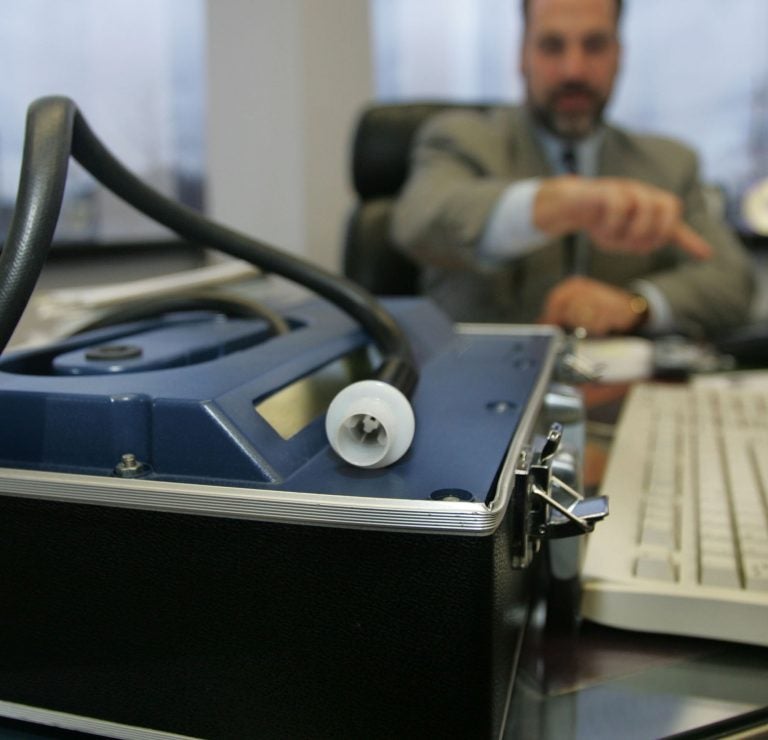20,000 DWI cases cast in doubt by N.J. Supreme Court ruling

Cherry Hill, NJ lawyer Evan M. Levow is shown with an Alcotest 7110 MKIII-C machine at his office in Cherry Hill, N.J., in a Tuesday, Nov. 22, 2005 file photo. The Alcotest, the successor to the Breathalyzer machine, is under scrutiny as the state Supreme Court considers an appeal challenging whether the machine provides reliable blood-alcohol level readings. (Jose F. Moreno/AP Photo, File)
On Tuesday, the New Jersey Supreme Court threw out the results of breathalyzer tests managed by an indicted staete police sergeant. Now, more than 20,000 driving while intoxicated convictions could be compromised.
Sgt Marc W. Dennis was indicted in 2016 for failing to properly calibrate the state’s Alcotest machines, as a former coordinator in the state police’s Drug Alcohol Testing Unit. Between 2008 and 2016, Dennis supervised Alcotests in Middlesex, Monmouth, Ocean, Somerset and Union counties. Authorities say Dennis, who also faces criminal charges in Monmouth County, failed to properly calibrate the machines’ temperature reading, thus compromising results.
The court’s ruling came in the case of Eileen Cassidy, who pleaded guilty to DWI where the Alcotest was the sole determinant of her blood alcohol content. Once she heard about the problems with calibration of the equipment, she requested to withdraw that plea. Cassidy died in March, but the Supreme Court issued a ruling in the case because so many other people were in a similar situation.
Kim A. Otis has handled DWI cases at his firm in Princeton for over 30 years. He says the ruling throws out only one part of a DWI conviction. “If you go back and file the motion, all it does is throw out the Alcotest reading. But the state can still convict you on the basis of what we call the observations case,” said Otis.
New Jersey’s Attorney General Office has yet to announce the plan for alerting people with effected convictions. Otis expects the ruling to lead to a reappraisal by prosecutors on a case-by-case basis. “The practical effect would be that a lot of them would probably want to just negotiate it or either dismiss it or maybe amend it to something like reckless driving,” he said.
New Jersey increases penalties for repeat offenders, including suspension of a driver’s license and jail time. Otis says removing a conviction could reset a person’s place in the system. “You’ve still already served most of the sentence, so that’s not the greatest thing in the world. But it is important if you were ever to be charged again. If you have one, to get rid of it means that you will be treated as a first offender the next time, and that’s a huge difference,” he said.
Otis, who began his career in the Mercer County Prosecutors office, says he doubts the incident compromises the system of drug and alcohol convictions. “So you got one bad apple and it has major ramifications. It could indicate some lack of supervision that maybe they need to look into. I don’t think it has any big picture implications,” he said.
WHYY is your source for fact-based, in-depth journalism and information. As a nonprofit organization, we rely on financial support from readers like you. Please give today.




